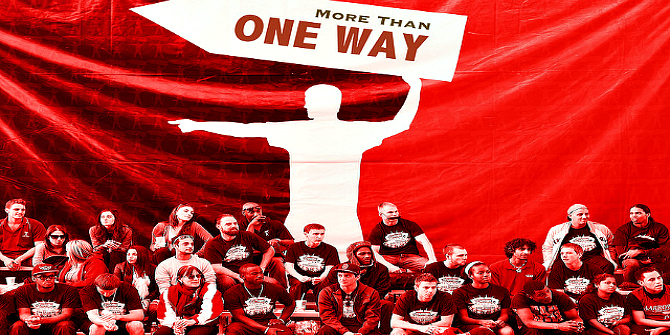 Managing Editor of the LSE Impact Blog Sierra Williams provides a brief round-up of qualitative and quantitative insights gleaned about the blog from a few different sources. From what content readers want more of to how people are accessing and using online information, this feedback provides some exciting directions for the blog to explore and focus on in the next year.
Managing Editor of the LSE Impact Blog Sierra Williams provides a brief round-up of qualitative and quantitative insights gleaned about the blog from a few different sources. From what content readers want more of to how people are accessing and using online information, this feedback provides some exciting directions for the blog to explore and focus on in the next year.
We recently celebrated our 4th birthday (wow!) and after all the birthday cake eating (chocolate) we have had time to reflect on what we have done over these years and how we can continue to grow. Analytics provides us with a good quantitative understanding of where our readers are coming from each week and what types of content are of interest. But to get a richer understanding of these metrics, we conducted our first ever Community Survey a few months ago. We reached out to readers to learn more about how they used the blog, what they are looking for, and how we can provide that better. Fundamentally we want to make sure that as we plan for future directions, we are growing with our community and are responsive to the changing landscape that is the wide world of research impact and higher education.
Along with our sister blog LSE Review of Books, we have taken some time to process just how supportive our reader and contributor communities are, what the blogs have been able to accomplish with these communities (a lot – reaching over 90,000 reads a week with increasing influence across sectors), and how we might be able to make the most of contributor involvement and editorially support. Making the most of our reader and contributor community is something we want to prioritise: it’s you who write great pieces for the site, allowing us to share and celebrate new perspectives, and find new and innovative ways to reach wider audiences with research.
So first of all, a big thank you for all your contributions, both with blogposts and with feedback. We’d like to provide a brief round-up of the things we’ve learned from this process, what we are already doing to act on what we’ve learned, and what the future holds. And in keeping with our sustained interest in getting evidence to go viral, we offer this list (tongue-in-cheek) under the Buzzfeed-friendly title:
Five awesome things we have learned from Google Analytics and our Reader Survey

1. Our community is international.
As we have grown over the years, we have focused on a wide-range of subjects. But being based in the UK and with the rise of the impact agenda in the UK and the impact-related elements of the Research Excellence Framework, our focus has been largely on UK-related policy issues. But we have to recognise that impact is of global significance. This shift has already taken place in our heightened coverage of Australian perspectives. But based on growing interest elsewhere, we will be looking particularly at covering scholarly issues in India, Brazil, and South Africa and investigating how we might facilitate non-English speaking perspectives. Here is a look at the top 10 countries that visit the blog:

 Anonymous feedback from Community Survey
Anonymous feedback from Community Survey
2. Over half of our readers (61% according to the reader survey) work in Higher Education.
We are a scholarly blog and our primary focus is on how, from the researcher side, we can improve the reach and relevance of academic research. As such, our primary audience has and will continue to be academic researchers. These figures certainly provide support for a continued emphasis on our community-development ethos. We want to help provide the Higher Education sector with a platform to discuss and debate the latest issues facing the communication, evaluation and eventual impact of academic research. This is not specific to one institution or to one discipline and we fully intend to continue to explore the pressing issues for a global and increasingly interdisciplinary research community.
With that said, I think it is also important to note that a significant amount of our readers are not academics or higher education administrators. Exploring themes that are of interest to the higher education community, but done in a way that is actively inclusive for those working in similar or adjacent sectors is crucial. We want to reach non-academics with our research, so it makes perfect sense to bring non-academics into this blog space as well.
3. 99% of survey respondents would recommend the Impact Blog to colleagues
Another measure of success we monitor very closely is whether our readers find our content useful enough, not only to read, but to share with others. Whether that is via Twitter, email or good ol’ fashioned word-of-mouth, we are constantly on the lookout for new ways to capture and record what people are sharing and how people are sharing. Our survey provided some great insights into this process and we were overwhelmed by the positive affirmation we received.
In order to understand our own impact, we know we need to delve more into what sharing and reuse means. A retweet doesn’t necessarily mean we’ve made a difference, but we do know of many examples of how something shared on Twitter has gone on to make a significant and demonstrable contribution (for example, blogs being used as course material). The share-able nature of blogs and online media offers some fantastic opportunities for impact but we have a lot to do to better understand these network effects. We have some exciting plans in store to follow up on these aspects in relation to academic blogs in the next year. Stay tuned!
 Anonymous feedback from Community Survey
Anonymous feedback from Community Survey
4. In terms of new content, How-to Guides for researchers were most frequently requested.
In addition to featuring the latest discussion and debate on the impact of research, we want to make sure the blog is useful. We know there is already a lot of content out there and we have sought to add value through the curation of useful resources for researchers on digital tools and academic writing. It is great to hear feedback that these guides have been useful and readers are looking for more. We will continue to identify gaps and commission these kind of valuable resources. We aim to have at least one piece a week under the theme of Tips and Tools (and I try whenever possible to share these on Thursday – for the completely arbitrary impulse to keep it alliterative).
To help signpost new readers to previously written resources, we have made a few changes to the homepage. You will find a Resources tab just below the most recent post. And on the sidebar of every page, there is now a quick link to discover more How-to Guides for Researchers.
Here’s a look at five of our top how-to guides over the last four years which, according to Google Analytics, have received over 300,000 views.
- 30 tips for successful academic research and writing
- Your essential ‘how-to’ guide to writing good abstracts
- How to write a killer conference abstract: The first step towards an engaging presentation.
- Why do academics choose useless titles for articles and chapters? Four steps to getting a better title.
- Say it once, say it right: Seven strategies to improve your academic writing.
 Anonymous feedback from Community Survey
Anonymous feedback from Community Survey
5. Newsletters are the future
Several respondents in our survey noted the need for better ways to hear about content by theme and via email. We currently offer an option to subscribe to the blog through email updates but with very limited functionality. This is a severe shortcoming. We know managing information overload is no easy task. Having to keep up with the latest tweets, the exponential growth of scholarly journal articles, and an endless inbox of emails is no easy task for the modern researcher. Blogs and online communities must look to provide tailored and information-rich ways of sharing interesting stuff with their network to help. There are definitely some great examples out there: The LSE USAPP Blog provides weekly round-ups of the best of political blogging focusing on US state and national issues. Another example of what good curation looks like is the Responsible Data weekly digest newsletter: regular, curated links and updates from the responsible data community around a core theme. We’ll be investigating how to present more curated selections of information to highlight relevant contributions and current events from across the community.
In summary, we’ve learned a lot, we’re looking to implement changes and we’re excited about the future of the LSE Impact Blog. To help us navigate these new directions, we’ve enlisted the help of an esteemed Advisory Board, which we will be officially launching next week. Watch this space!
Note: This article gives the views of the author, and not the position of the LSE Impact blog, nor of the London School of Economics. Please review our Comments Policy if you have any concerns on posting a comment below.
Sierra Williams is Managing Editor of the LSE Impact blog. She has an MPhil in Conflict Resolution and Reconciliation Studies from Trinity College, Dublin and a BA in Sociology from the University of San Francisco. Sierra previously provided research and administrative support for the LSE Impact of Social Sciences Research Project. Her interests are in open scholarship (including using social media across the research lifecycle), digital distributed communication networks, the role of expertise in society, and data sharing in the social sciences. She tweets @sn_will.









2 Comments